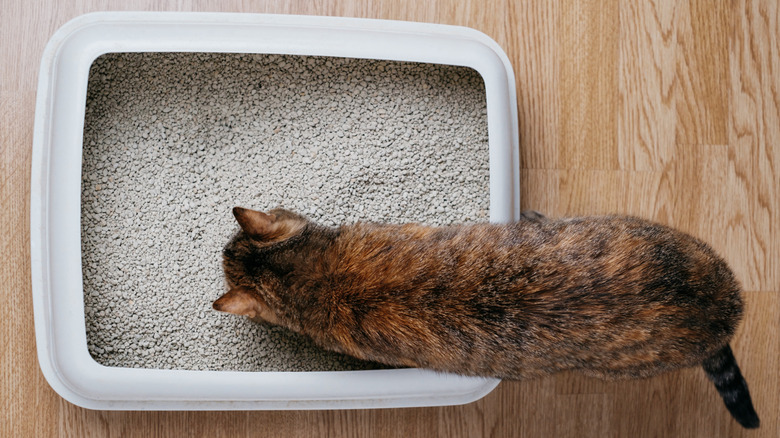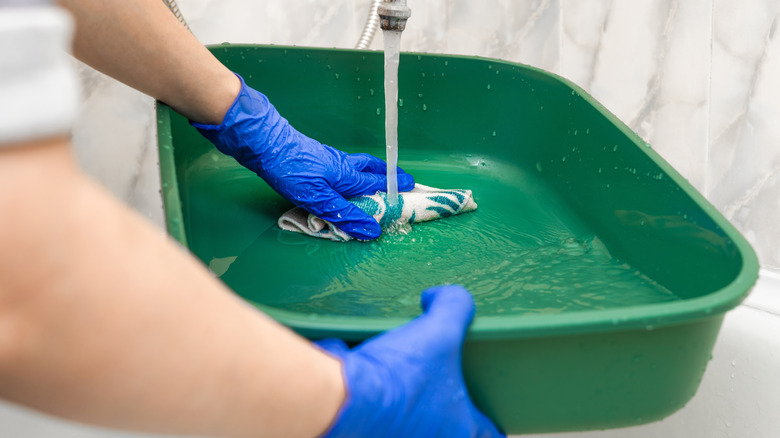What Can Happen To Your Cat's Urinary Health If You Don't Clean The Litter Box Enough
We may receive a commission on purchases made from links.
Cleaning the litter box can be a pain, but it's an important part of maintaining your cat's well-being, especially when it comes to its urinary health. A 2019 survey of about 12,000 Australian cat owners published in the Journal of Feline Medicine and Surgery found that 17.1% of owners noted urinary problems in their pets, including hematuria, or blood in the urine, and urethral obstruction, which inhibits a cat's ability to urinate. In addition, many felines exhibited inappropriate urination outside of the litter box. These issues increased in homes with multiple cats, too few litter boxes, and not enough litter-box cleaning.
Though it may seem obvious, a 2017 study published in Behavioral Processes found that cats prefer clean litter boxes and use them more when they're sifted and cleaned more often. Additionally, unclean litter boxes can have unhealthy levels of ammonia because of excess cat urine, which can hurt people, too.
Litter box-related urinary issues are common in cats
According to the American Society for the Prevention of Cruelty to Animals, a minimum of 10% of cats experience issues with relieving themselves, including those related to the litter box. Moreover, cats develop urinary tract disorders in spades, leading to ample health problems, rehoming, and, in some cases, death.
There are many reasons why a cat may develop a urinary issue from using a dirty litter box. This can include the box not being cleaned enough, being too small or uncomfortable, having too few boxes for your number of cats, and even using too much litter. As a result, underlying health issues can be exacerbated. Urinary tract infections (UTIs), feline interstitial cystitis (FIC), kidney stones, stress, and behavioral changes can all emerge.
Lingering bacteria in a dirty litter box can lead to a UTI, as these harmful bacteria may make their way up your cat's urinary tract when they squat to go potty. In addition, UTIs caused by dirty litter boxes can lead to the formation of bladder stones, making the problem worse. The stress of using a dirty litter box can also worsen inflammatory issues like FIC. Basically, the issues add up quickly when cats use dirty litter boxes.
How to provide a healthy, clean litter box for your cat
Cleaning your cat's litter box regularly can help keep your furry friend healthier. You may wonder how often you should change your kitty litter. Well, here's your answer once and for all: Your cat's litter should be scooped daily, and the entire box sanitized or wiped down weekly. In addition, you should regularly replace your cat's litter box and scoop.
You can also make some changes if your cat is having trouble or seems uninterested in the options provided. Try using a larger box with shallower litter to give your feline more room to move around. A choice of clumping or unscented litter provided in multiple boxes can also let your cat pick which they prefer. Lastly, a self-cleaning litter box such as PetSafe's Scoop Crystal Pro Front-Entry Automatic Litter Box can help ensure the litter stays clean even if you can't scoop it daily.
If you need to swap your cat's litter, a 2022 study published in the journal Animals recommends doing so slowly. The researchers found that six days was enough time to transition a feline to a new litter without disrupting its usual activities. The study also recommended exposing your cat to the new litter before swapping it by placing it in another litter box nearby.


